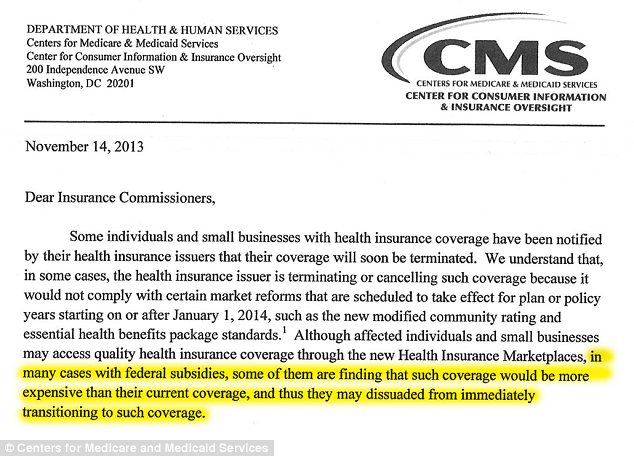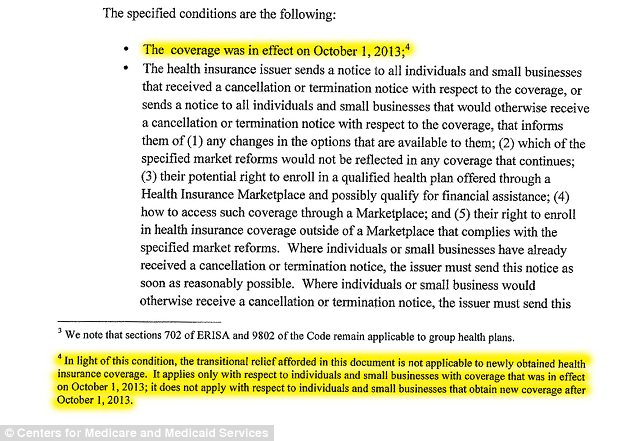 The Obama Administration has admitted that even with taxpayer-funded subsidies, many Americans will have to pay more for their ObamaCare plan than they were paying for their previous healthcare plan.
The Obama Administration has admitted that even with taxpayer-funded subsidies, many Americans will have to pay more for their ObamaCare plan than they were paying for their previous healthcare plan.
by David Martosko
The Obama administration has directly conceded for the first time that ‘in many cases,’ health insurance plans offered through government exchanges are more expensive than plans consumers bought before the Affordable Care Act became law – even when government subsidies are figured in.
In a letter to state insurance commissioners, Center for Consumer Information and Insurance Oversight director Gary Cohen wrote on Thursday that one reason for the new Obamacare measures the president announced Thursday is that millions of consumers receiving cancellation letters from their insurers are learning the Affordable Care Act options are in fact less affordable.
‘Although affected individuals and small businesses may access quality health insurance coverage through the new Health Insurance Marketplaces,’ Cohen wrote, ‘in many cases with federal subsidies, some of them are finding that such coverage would be more expensive than their current coverage, and thus they may [be] dissuaded from immediately transitioning to such coverage.’
His written statement contradicts President Obama’s campaign promises that the Affordable Care Act would lower costs for Americans.
In October of that year he said during a campaign rally in Columbus, Ohio that ‘we are going to work with you to lower your premiums by $2,500. We will not wait 20 years from now to do it, or 10 years from now to do it. We will do it by the end of my first term as president.’
Cohen’s letter also goes further than the words Obama used Thursday to hedge his bets while he outlined a new strategy to allow Americans to keep policies that their insurers have already canceled.
‘My working assumption was that the majority of those folks would find better policies at lower cost or the same cost in the marketplaces,’ he said.
‘We will continue to make the case, even to folks who choose to keep their own plans,’ Obama promised minutes later, ‘that they should shop around in the new marketplace because there’s a good chance that they’ll be able to buy better insurance at lower cost.’
That ‘good chance’ of cost savings is a weaker standard than the White House has employed before with messaging that promised no insurance price hikes to ‘most people.’
On Nov. 4 the president told a partisan crowd of Obamacare supporters in Washington, D.C. that ‘because of the competition between insurers’ buily into the Affordable Care Act, ‘and the new health care tax credits, most people will be able to buy better plans for the same price or even cheaper than what they’ve gotten before.
Cohen’s office is a subagency of the Centers for Medicare and Medicaid Services, the Health and Human Services Department agency in charge of implementing the failed healthcare.gov website that has made Obamacare’s rollout a cringe-inducing national embarrassment.
His letter also sets the terms of Obama’s new policy shifts, outlining a rule that would only apply to insurance policies in place by October 1.
‘The transitional relief afforded in this document is not applicable to newly obtained health insurance coverage,’ he wrote.
‘It applies only with respect to individuals and small businesses with coverage that was in effect on October 1, 2013.’
Insurers may balk at the president’s latest set of requirements. His new ‘fix’ to Obamacare would require companies to write to each cancelled policyholder, outlining their options including the new exchanges.
An insurance industry executive who requested anonymity told MailOnline that the cost of complying will reach tens of millions of dollars.
‘If we cancelled a half-million [people],’ the executive said,’ now we have to spent money researching every policy to see what to do, then send a half-million letters in the mail? Good lord.’
The president of the health insurance industry’s largest trade group warned Thursday that Obama’s new plan ‘could destabilize the market and result in higher premiums for consumers.’
‘Premiums have already been set for next year based on an assumption of when consumers will be transitioning to the new marketplace,” according to Karen Ignagni, the president of America’s Health Insurance Plans.
‘If now fewer younger and healthier people choose to purchase coverage in the exchange, premiums will increase and there will be fewer choices for consumers.’
. . . . . . . . . . . . . . . .
David Martosko is the U.S. Political Editor of the Daily Mail (London).

